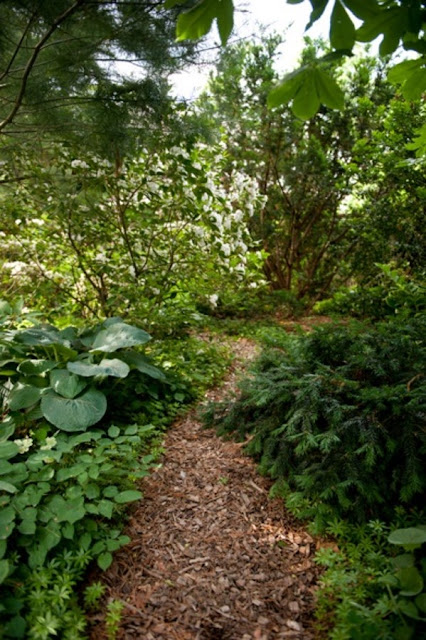 |
| I'm gradually transferring wood chips from the driveway to the garden |
Now is a great time for spreading wood chip mulch. On warmer days, I’d like to be outside doing something in the garden, but nothing’s growing. That’s when I load up the wheelbarrow with wood chips and trundle around the yard to dump them where they’re needed.
After working with this mulch for eight years, I’m a huge fan. It’s a sustainable choice, because the chips originate in my own yard or nearby where Kevin’s men are pruning or taking down trees. The chips are easy to work with, much less dense than bark mulch.
 |
| A wheelbarrow full of wood chips isn't too heavy to maneuver |
Unlike bark, they don’t contain wax, so they don’t block water from soaking into the soil. The first time I dug into the soil under the wood chip mulch, I was amazed. It’s dark, moist and rich—just what a gardener hopes for.
This year I’m spreading wood chips around trees and shrubs, and I plan to add some to the garden paths, where they break down fastest because of heavy foot traffic. If I do more sheet composting, they’ll be a key ingredient.
 |
| Sheet composting March 2019: wood chips on top of composted cow manure |
My source of mulch information is Linda Chalker Scott, a horticulturist and mulch scholar at Washington State University. She corrects conventional wisdom with scientific fact. For example, people worry that wood chips will acidify soil. Research shows they don’t. I’m increasingly aware that soil is not an inert substance. It’s full of biological and chemical activity, including an effective buffering system. You can’t change the pH of soil without adding chemicals such as lime to make it more alkaline or sulfur to make it more acid.
There’s a gardening legend that high carbon mulch such as wood chips depletes nitrogen in the soil. Linda studied this and found no evidence for it. She hypothesizes that there’s a narrow band of relative nitrogen deficiency at the interface between the soil and the wood chip mulch. This is actually a plus, because it suppresses weeds. You can use this mulch anywhere in the garden except where you’re going to plant seeds or young annuals that don’t have an established root system. Like young weeds, they’d suffer in this nitrogen-poor zone.
 |
| Wood chip mulch will suppress weeds around this tree |
Can chips from diseased trees infect your yard? This is a concern I often hear from garden club members. It turns out not, because the disease organisms in mulch can’t reach plant roots. I often see impressive networks of white fungal hyphae among the chips, either in the pile or after they’ve been on the ground for a while. Linda Chalker Scott explains that these fungi are decomposers, not pathogens. With their help, wood chips decompose slowly, gradually releasing nutrients our plants’ roots can use. I’m grateful to have this free material for pampering my plants and soil.

No comments:
Post a Comment